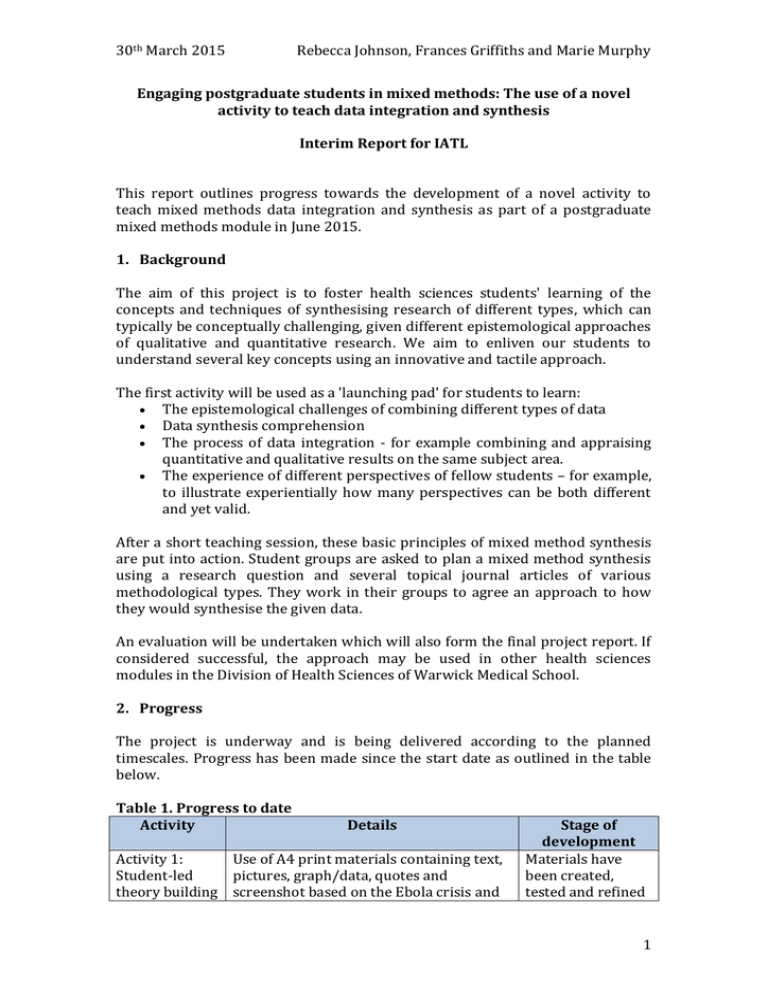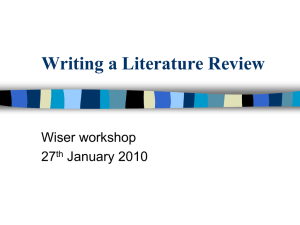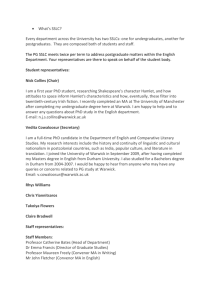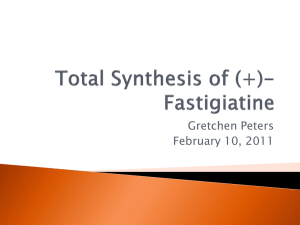30 March 2015 ... Engaging postgraduate students in mixed methods: The use of a...
advertisement

30th March 2015 Rebecca Johnson, Frances Griffiths and Marie Murphy Engaging postgraduate students in mixed methods: The use of a novel activity to teach data integration and synthesis Interim Report for IATL This report outlines progress towards the development of a novel activity to teach mixed methods data integration and synthesis as part of a postgraduate mixed methods module in June 2015. 1. Background The aim of this project is to foster health sciences students' learning of the concepts and techniques of synthesising research of different types, which can typically be conceptually challenging, given different epistemological approaches of qualitative and quantitative research. We aim to enliven our students to understand several key concepts using an innovative and tactile approach. The first activity will be used as a 'launching pad' for students to learn: The epistemological challenges of combining different types of data Data synthesis comprehension The process of data integration - for example combining and appraising quantitative and qualitative results on the same subject area. The experience of different perspectives of fellow students – for example, to illustrate experientially how many perspectives can be both different and yet valid. After a short teaching session, these basic principles of mixed method synthesis are put into action. Student groups are asked to plan a mixed method synthesis using a research question and several topical journal articles of various methodological types. They work in their groups to agree an approach to how they would synthesise the given data. An evaluation will be undertaken which will also form the final project report. If considered successful, the approach may be used in other health sciences modules in the Division of Health Sciences of Warwick Medical School. 2. Progress The project is underway and is being delivered according to the planned timescales. Progress has been made since the start date as outlined in the table below. Table 1. Progress to date Activity Details Activity 1: Use of A4 print materials containing text, Student-led pictures, graph/data, quotes and theory building screenshot based on the Ebola crisis and Stage of development Materials have been created, tested and refined 1 30th March 2015 exercise (Synthesising different types of information) Activity 2: Synthesising mixed studies research evidence Evaluation of activities Rebecca Johnson, Frances Griffiths and Marie Murphy fruit and vegetable intake. Students work in small groups to construct a narrative and make sense of the topic. Through this activity, students can begin to understand the principles related to synthesising different data types Students are given a research question and several research papers. They must work together to identify an appropriate mixed studies (MS) review approach for the research question given to them. They must decide which papers to include/exclude, what MS review approach to use, identify which integration techniques might be most suitable given the types of data in the papers, and provide rationale for each decision. Research papers will be different subject areas than activity 1 subjects (attached in appendix 1 and 2). Next steps are to send the materials to print. Research questions have been identified (topics are childhood obesity and type 2 diabetes) and searching for appropriate papers has started. The next step is to finalise the 5-6 papers per topic to include, test and refine the activity. We will record the sessions through audio The next steps are or video. Student and facilitator feedback to make will also be collected through short arrangements for interviews. These elements will be the hire of compiled to form an evaluation report for audio/video submission to IATL. equipment from IATL. A plan for interviews and other evaluation elements to record also needs to be agreed. 3. Financial statement and personnel The maximum grant awarded from IATL is £772.07. The project is currently within budget and it is expected that the full grant award will be required. A PhD student has been employed to develop content for the two activities, support the facilitation of the activities within the module delivery and support the evaluation and report submission. A maximum of 40 hours of work has been allocated within the budget for PhD student employment. At the time of writing, the student has completed 14 hours of work. The other costs assigned to this project are printing costs and potential recording equipment hire. Printing has not yet been undertaken therefore costs are to be established. 2 30th March 2015 Rebecca Johnson, Frances Griffiths and Marie Murphy The table below outlines expenditure to date and expected future costs. Table 2. Expenditure to date and expected future costs. Item Expenditure Max. to date expected future costs Employment of 1 PhD student through Unitemps £153.30 £284.70 @£10.95 per hour Printing of activity 1 cards at Warwick Print Awaiting quote Hire / purchase of recording equipment To be established 4. Project timeline and project outcomes The planned timescales were as follows: December 2014: Identify PhD student and arrange post with Unitemps complete January 2015: Development of activity 1 and A4 sheets – complete March 2015: Send A4 sheets to Warwick Print – awaiting quote June 2015: Delivery of activity July 2015: Submit final project report Outcome 1. Development of adapted material (yes/no) Outcome 2. Use of activity in the mixed methods module (yes/no) and level of satisfaction of students during routine feedback (yes/no) Outcome 3. The use of digital engagement for a) delivery on feedback to students on content and team-working (yes/no), b) refinement of activities (yes/no; level of satisfaction; audio/video recording to identify meeting of learning outcomes) Outcome 4. Development of second activity (yes/no; number of students reached; level of satisfaction) 3




